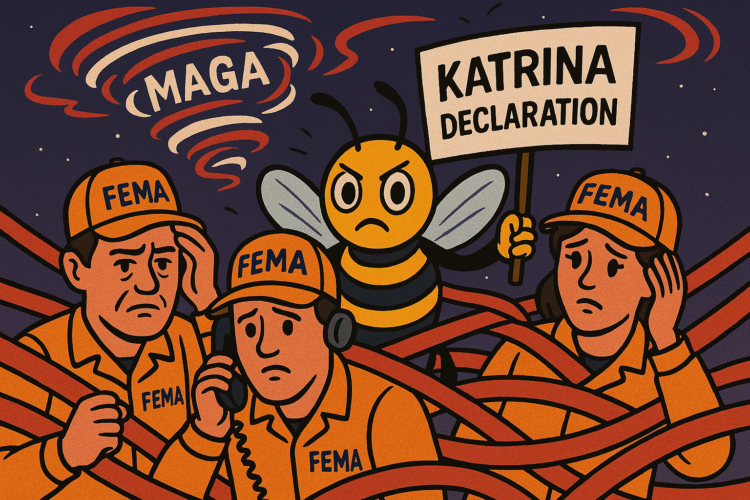
On August 26, 2025, something seismic occurred—not an earthquake, not a storm, but a different kind of tremor. Over 180 current and former FEMA employees—many anonymous—signed an Open Katrina Declaration, warning Congress and the FEMA Review Council that the Trump administration is unravelling decades of post-Katrina reforms. It wasn’t just a letter; it was a bulk delivery of institutional trauma, written in dry government-issue Times New Roman. And the response? Within days, dozens of signatories—36 named—were put on paid administrative leave, given vague “check-in daily” directives. The message was clear: warning that FEMA’s leadership is dangerously unprepared? That’s a firing offense.
This is reality TV activated by politics—where the institution designed to respond to hurricanes, wildfires, and floods has been flooded itself by retaliation.
1. The Katrina Declaration: Silence Fracturing
Let’s start with that declaration. FEMA, the federal agency tasked with national disaster responses, became its own political controversy. These employees—some of whom identified themselves, others who did not to protect their careers—warned that inexperienced leadership, staff cuts, budget slashes, and politically motivated controls have gutted the agency’s capacity. They invoked Katrina-era reforms—five-star chaos emergency plans once intended as memorials to failure now lined with anti-corruption measures.
This declaration wasn’t doom-scroll fodder; it was a shining beacon of civil duty: bread and rice in federal fonts, setting your agency’s sacred mandate on fire. Then they were told to take paid leave.
2. FEMA: Monumental Mission Meets Political Performance Art
Think about it: the agency responsible for wiping blood and debris off citizen’s foreheads was turned into a boardroom spectacle. Sign an internal document saying the ship’s sinking? Career hit pause—like a horror film where the Titanic is the galaxy.
FEMA staff didn’t protest wages or wear silly hats. They said, Your strategy will kill us in the field. And leadership’s response was swift: Take a paid vacation while crisis approaches. The disaster of feedback became a disaster of governance.
No Congressional hearing yet. Instead: rumored gag orders, ominous “daily check-ins,” and the looming specter of HR silence. FEMA now resembles a sitcom where the ridiculous overtakes the real—except the stakes are lives, not laugh tracks.
3. Armed With Knowledge, Fired With Smiles
The irony is grotesque: the people warning us about disaster preparedness are themselves in danger of disaster. But it’s not floods and hurricanes threatening them—it’s politics. When you weaponize disruption, heroes become liabilities. These are the people who once coordinated massive evacuations, now mired in administrative thermal water. Paid leave or not, the disruption is a disruption itself.
In a single stroke, disaster workers were transformed into test subjects. Will fear and bureaucracy suffocate their voice? The answer to me is the same as FEMA’s Sunshine vs the Week: It’ll stay hot until someone barks that FEMA needs to be thick-skinned.
4. Respect Employees or Suffocate the Ship?
FEMA’s history is a checkered tapestry. Pre-Katrina incompetence. Post-Katrina reforms forged by survivors. Then, when leadership changed, every spark for improvement gets replaced by firehoses of sabotage. Staffing cuts erase institutional memory. Political directives micromanage everything—parade permissions over actual rescue protocol. A deployment could be ghostwritten by PR briefs rather than needs assessments.
When declared disaster is met with internal mutiny—expressed through district reforms rather than breaking windows—you do not airbrush the institution. You listen. But this is Trumpian FEMA: Listening is optional. Supervision is mandatory. Silence, the default.
5. Whistleblower or Warthog?
Now watch the Spin Tornado whirl. Republicans say, Mooching on paid leave. Some media say, Drama queens of emergency services. The central ironies? Paid leave is a privilege. Coming forward in service of the public is not cowardice. And Dawson’s Creek had fewer plot twists. FEMA staff aren’t attention seekers—they’re professionals whose function is emergency care, not media exposure.
It’s easy to point fingers, but rescue cannot be pushed into silence. When those who build emergency bunker rolls are silenced, the public becomes the next casualty.
6. Governors, Congress, and the FEMA Divide
Congress must hear this. Not in white-washed PR testimonies, but unfiltered. The FEMA Review Council must postpone stock tips and hear the pain. Governors used to work with FEMA to coordinate responses, not stage rehearsals for photo ops. This purely policy theatricalization erodes trust faster than floodwaters do.
When the government silences its internal voices of concern, it betrays not just its employees, but the public trust. FEMA’s trauma is a national trauma in waiting.
7. A Cautionary Tale Dressed in FEMA Vests
What if the day comes and disaster strikes? Who do we trust: the figureheads not wanting criticism, or the people whose boots are already in the pre-dawn muck? When the system responds politically, not federally, the public pays—Levees, lives, and leaks.
The FEMA story isn’t just about Whistleblowerea. It’s about democracy’s layers: that those who serve must be able to speak, lest the system drown its credibility in its own hubris.
Museum Exhibit: The “Katrina Declaration”
Title: “Katrina Declaration & the Great FEMA Check-in Rinse”
Date: August 26–28, 2025
Action: Over 180 FEMA staff signed a whistleblower-style document warning of rollback in reforms. Within days, dozens… placed on paid leave.
Permission Denied? Official orders canceled. Interests of national security used to stifle dissent rather than propagate integrity.
Exhibit Message: This is where disaster planning became political theater, and those meant to administer disaster recovery were declared problems themselves.